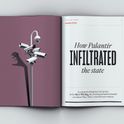Splendid isolation
Ethan Zuckerman’s essay on the potential for Russia and China to fracture the global internet misses important developments that illustrate both the ideological and technological differences between China and Russia, and the lack of public awareness of the institutions that underpin the internet’s technical architecture.
Zuckerman is correct to see China as having the greater ability to implement the authoritarian dream of a Great Firewall. Yet there are signs its original design is creaking and due for an upgrade. China wants to build something new and export it, and is pushing heavily at technical standards organisations, where experts and engineers define shared ways of implementing new technologies.
A set of proposals, dubbed New IP, were put forward in a UN standards organisation by Huawei and other Chinese actors in 2019. If adopted, these would create a new kind of network optimised for surveillance, with a technical architecture that would undermine the open, interoperable protocols that have been key to the internet’s global uptake. This splinternet could be deployed at home, exported through China’s vast Belt and Road Initiative or donated to other countries through development arrangements. While the initial proposals were defeated, New IP has not gone away—it is being rebranded and submitted for consideration in other standards organisations.
Russia has no such strategic or technical capability, as Zuckerman’s description of its latest experiment in internet isolation bears out. But the recent case of Californian company Icann and the Russian .ru domain casts the Kremlin’s project in a different light. Rather than being a not-so-great firewall, perhaps Russia’s splinternet is partly a defensive exercise—a business continuity plan, just in case an external force decided to cut the country off from the global internet.
After Putin’s invasion, the Ukrainian deputy prime minister wrote to Icann, a central cog in the internet’s infrastructure, requesting that it remove Russian domains from global networks. Icann politely declined, citing its technical role and the far-reaching implications if its decisionmaking were to be influenced by geopolitics.
Icann made the right call, but what if it hadn’t? The company’s restraint does not alter the fact that a private Californian non-profit has the power to fracture the internet.
Fifty years on from the internet’s genesis as a research project, run by what computer science legend Wendy Hall has dubbed “a league of gentlemen,” the informality of the underlying governance structures persists. Perhaps these institutions deserve a little more public attention and scrutiny than they currently enjoy.
Emily Taylor, Oxford Information Labs
The Brexit effect
In Tom Clark’s excellent round-up of the economic effects of Brexit, he noted that exports to the EU “look almost unaffected on the headline numbers.” As ever with statistics, it depends on how you cut it.
If you compare UK goods exports to the EU with sales to the rest of the world, the headline export numbers seem fine. But the other way is to compare UK exports to those of other rich countries. This data tells a much worse story, which suggests that Brexit is damaging UK goods trade both in Europe and elsewhere.
Advanced economies’ goods exports have mostly recovered rapidly from the coronavirus pandemic, and are now above their 2019 level, while UK exports are lower. I’ve estimated how badly Brexit has hit goods exports by comparing Britain to a “doppelgänger UK,” which is made up of a few rich countries that are picked because their economic performance closely matches the UK’s before it left the single market and customs union. The countries are the US, Germany, Canada, New Zealand and Australia. By the end of 2021, the UK’s goods exports were 16 per cent lower than the doppelgänger’s.
British exports to the EU have underperformed, but so have those to the rest of the world. UK exporters serving global markets may be finding it harder to source components from Europe, and global manufacturing companies have moved some plants to the EU from Britain, which would reduce UK exports generally if these companies use plants to serve EU and non-EU markets.
What is clear is that Brexit, far from ushering in “Global Britain,” is making it harder to achieve.
John Springford is deputy director of the Centre for European Reform and runs the regular “Cost of Brexit” report series
Sam Freedman’s conclusion is too neat. He claims that relatively low opposition to immigration in current polling shows Remainers were wrong to blame the Brexit vote on barely disguised racism. But that was the principal and very successful thrust of the Johnson-led Vote Leave campaign as well as of Farage’s Leave.EU, and in turn dictated the May and Johnson governments’ red line on freedom of movement. With the significant reversal of EU immigration witnessed since, the anti-immigrant right has achieved a major victory, of a kind that eluded Enoch Powell’s overtly racist campaign against black immigration half a century ago.
The public may currently appear less fussed about the number of migrants, but anti-immigration politics has never been mainly about this—as the panic over refugees arriving in dinghies shows. The government’s cruel Rwanda scheme is not the aberration that your author implies, but confirms that it still sees plenty of mileage in stoking the fear of others.
Martin Shaw, author of “Political Racism: Brexit and its Aftermath”
What a woman is
To suggest that the meaning of the term “woman” is flexible, a matter of changing societal opinion or a question of linguistics, is wrong.
There are reasons why there are so many derogatory terms for women and why in many languages “woman” is the same word as “wife” (femme in French, frau in German) but this is about men’s attitudes to women, not about what women actually are.
To me, and to science, a woman is an adult female human whose biology at birth is indisputable. That some humans have chromosomes that don’t fit the male or female definition, or whose core belief is that they were born into the wrong body, is something I have a great deal of compassion for; I fully support their right to undergo medical procedures should they wish to.
Maybe linguistics will eventually give us a new word for trans women and trans men that would be acceptable to all, but “woman” and “man” they cannot be. It’s attitudes to people who are different that need to change, rather than people being defined only as women or men.
Kathryn Fox, via the website
The Oxford temper
As someone who has been teaching undergraduates at an Oxford college for the past six years, I have a few riders to Andrew Adonis’s stimulating and incisive article.
I think it is a grave mistake to force elite universities to become vehicles of social engineering: academic promise (and a certain personal grit) must be their absolute priority, regardless of candidates’ backgrounds or disadvantages. The necessary work of “levelling up” must be done further down the state educational system, particularly at the under-resourced and under-performing secondary level.
The Etonians (and indeed the alumni of all the major private schools) that I have encountered have been nothing like the crassly entitled, brutally right-wing Bullingdon Club and Union oafs described by Adonis. To a man and woman, they have all been refreshingly open-minded individuals who have richly merited their places. What concerns me more is the number of students from comprehensive schools, often admitted for reasons of meeting a quota, who are simply not equipped to deal with the inevitable academic (and social) pressures. Fetishising entrance to Oxford and Cambridge as an ultimate goal does not always do them a favour.
Rupert Christiansen, London, SW9
Churchill’s crimes
I agree with almost all of Priyamvada Gopal’s essay on the crimes of our wartime leader and indeed most of the Tariq Ali book under review. But of course there was an immense amount of collusion in imperialist policy and attitudes across the political spectrum, permeating British political culture well into the 1950s.
This included Labour members of the wartime Cabinet during the Bengal famine, the pro-imperial attitudes of Ernest Bevin and many other working-class leaders (the Independent Labour Party was a notable but largely ineffectual anti-imperialist exception, and even it contained some imperialists), and what could arguably be called war crimes committed in Malaya during the “emergency” under a Labour government, before Churchill returned as prime minister.
Tony Judge, via the website
Gopal is well known for her dislike, verging on hatred, for Churchill and her article clearly displays this. Though of course everyone has the right to publish their opinions, there are certain dangers when academics in powerful positions do so with such forthrightness and determination to gain publicity for them.
Many (most?) prominent political figures who some members of the public quite rightly revere for the positive contribution made in the course of the nation’s history are likely to have held views and acted in ways that now with hindsight can be criticised. However, on balance they probably contributed more to our life’s betterment than Ali or Gopal, who seem to make a good living running Churchill down and whose life’s work will not be long remembered.
John Hawkes, via the website
Revering Raphael
As a student of art history in the 1970s, I found the Pre-Raphaelites featured prominently in our syllabus, thanks in part to the interest of our tutor, Quentin Bell, in this quirky fellowship of reactionary painters. To balance this we had plenty of Dada and German Expressionism, but barely a mention of the High Renaissance. We would, it was assumed, learn all about that anyway.
The current Raphael exhibition at the National Gallery makes me realise how much we missed—and wonder what on earth Dante Gabriel Rossetti and his friends found to dislike in the work of this sublime painter.
How much I have learned since entering the first room at the National and facing Saint Sebastian, painted in 1502 when Raphael was just 19. As I walked through the galleries and was bathed in the beauty of the work, its scope, vision, technical brilliance, tenderness and passion, I was astonished to discover that all this was the product of just two decades. I have found a new reverence for Raphael.
Andrea Marechal Watson, arts journalist
Envying the neighbours
Serena Smith’s experiences closely track my own, though in my late fifties I doubt mine still count as “young.” Yet the sense that continental nations live with more gusto has been with me ever since I first spent serious time in Europe in the 1980s. They seem to widely live more active and engaged lives there, with expectations (including of themselves) to match. The vastly superior coffee and cakes are expressions of an attitude; it is no accident that we have no vocabulary for hygge or la dolce vita.
A nation’s culture is not only found in its major institutions, but also in the quality and habits of everyday life, from pleasant public spaces and beautiful shop window displays, to care over personal presentation and interactions and the ways in which people choose to spend their time.
I’ve spent decades pondering reasons for the difference. It can’t be the climate, when even the Scandinavians do it better than us. It can’t be a religious hangover, since it’s found from Sweden to Italy. So I’m left with the conclusion that our hierarchical society is to blame. Many of this nation’s “good things” remain largely the preserve of the socio-economic elite. Despite the pretensions of the metropolitan classes, a lingering suspicion of perceived social ostentation deters many from living “up.”
Ian Stock, Essex
The Church’s sins
I have followed the persecution of Martyn Percy with growing alarm and horror not only because of the scale and intensity of the campaign against him, but because it reveals in shocking detail what no one can fail to see: that the CoE is a toxic institution to work in and for. Like Percy, I have been ordained for over 30 years. I am now a Quaker.
Peter Law-Jones, via the website
Clarification
A box alongside Martyn Percy’s recent essay stated that Peter Ball, the disgraced former bishop of Lewes, had admitted to the abuse of 18 young men and teenagers. There is a dispute over whether Ball’s victims number 16, 17 or 18: though some of the cases were abusive, others—while representing misconduct in public office—were consensual encounters with adults.
In fact
In 2020, out-of-pocket spending by Britons on healthcare was equivalent to 1.8 per cent of GDP—a rate only just below that of Americans (1.9 per cent).
Financial Times, 28th April 2022
Only 7 per cent of animal species are sexually monogamous.
“Bitch: A Revolutionary Guide to Sex, Evolution and the Female Animal” by Lucy Cooke
In Konasheher county in the Uighur heartland of China, nearly one in 25 people has been sentenced to prison on terrorism-related charges—the highest imprisonment rate in the world.
Associated Press, 17th May 2022
Benjamin Franklin included a herbal recipe for abortion in The American Instructor (1748), his update of a British how-to manual.
Slate, 5th May 2022
More than half of global fibre production is polyester (nearly 58m tons)—about twice that of cotton, which is in second place.
Works in progress, 21st April 2022
From 2019 to 2021, a single traffic camera system at Bank Junction in the City of London raised £15.2m in penalty charges.
Bloomberg, 6th May 2022
Out of the 85 football clubs ever relegated from the Premier League, just over a quarter (22) were promoted straight back the next year; just over a third (29) have yet to return.
Mirror, 2nd May 2022
Of the tracks on Spotify today, 22.4 per cent, or 17.5m, have been played fewer than 101 times since the service launched in 2008.
MusicBusinessWorldwide, 25th April 2022
On day one of President Donald Trump’s 2018 visit to Britain, the Queen wore a brooch that was a present from the Obamas; on day two, a brooch given to her by the Canadian people; and on day three, a brooch habitually worn during mourning, including by the Queen Mother at George VI’s funeral.
The Art Newspaper, 30th May 2022












